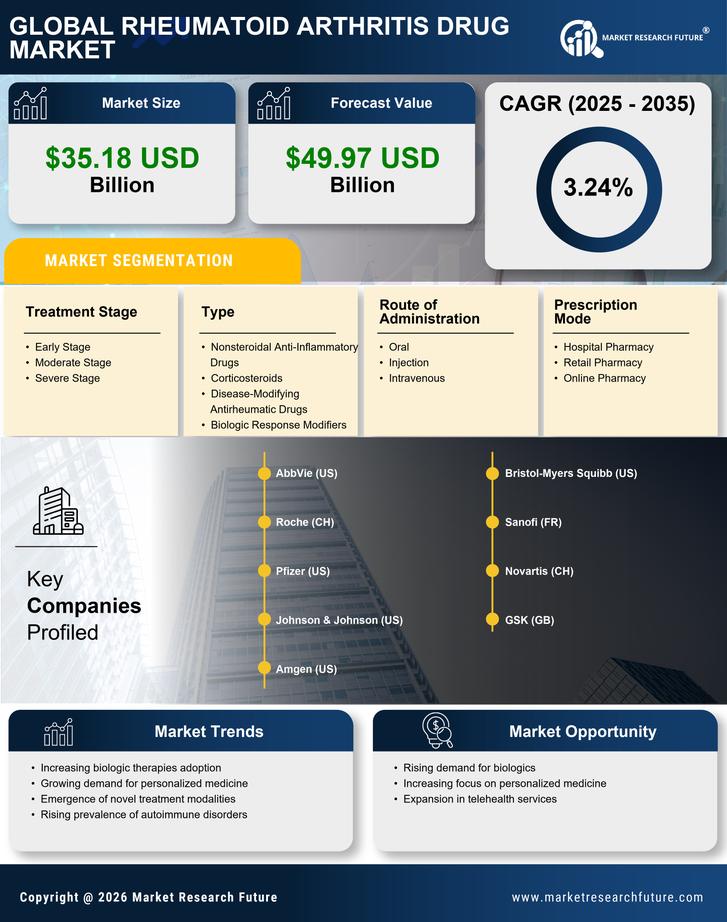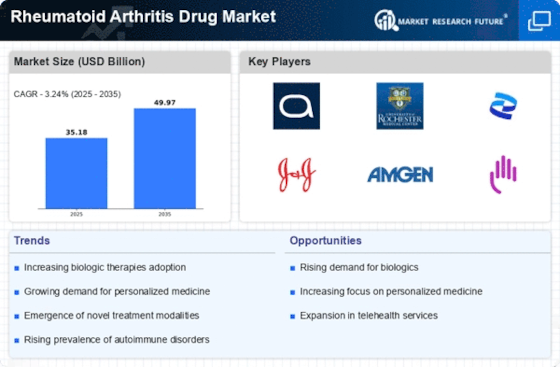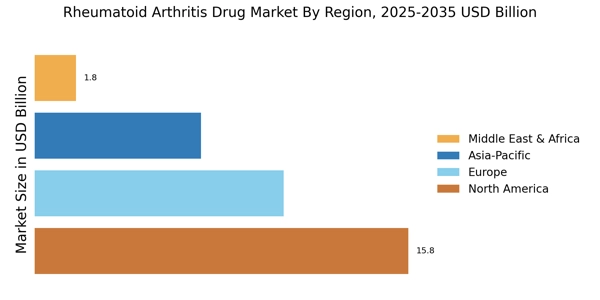Rising Healthcare Expenditure
The escalation of healthcare expenditure is a crucial factor driving the Rheumatoid Arthritis Drug Market. As countries allocate more resources to healthcare, there is a corresponding increase in spending on medications for chronic conditions like rheumatoid arthritis. Reports indicate that healthcare spending has risen significantly, with some regions experiencing annual growth rates exceeding 5%. This financial commitment allows for greater access to advanced therapies, including biologics and other novel treatments. Additionally, increased insurance coverage and reimbursement policies for rheumatoid arthritis medications further facilitate patient access to necessary treatments. As a result, the Rheumatoid Arthritis Drug Market is likely to see sustained growth, fueled by the willingness of healthcare systems to invest in effective management solutions.
Advancements in Drug Development
Innovations in drug development are significantly influencing the Rheumatoid Arthritis Drug Market. The emergence of novel therapeutic agents, particularly biologics and targeted synthetic drugs, has transformed treatment paradigms. For instance, the introduction of Janus kinase (JAK) inhibitors has provided new avenues for managing rheumatoid arthritis, offering patients alternatives to traditional therapies. The market for these advanced treatments is projected to grow, with estimates suggesting a compound annual growth rate (CAGR) of over 8% in the coming years. This trend indicates a robust pipeline of new drugs, which is likely to enhance treatment efficacy and patient outcomes. Consequently, the Rheumatoid Arthritis Drug Market is expected to benefit from these advancements, as healthcare providers increasingly adopt innovative therapies.
Growing Focus on Patient-Centric Care
The shift towards patient-centric care is reshaping the Rheumatoid Arthritis Drug Market. Healthcare providers are increasingly prioritizing the needs and preferences of patients in treatment decisions. This trend is evident in the development of personalized medicine approaches, which tailor therapies to individual patient profiles. By focusing on patient outcomes and quality of life, the industry is witnessing a surge in demand for drugs that not only manage symptoms but also enhance overall well-being. Furthermore, patient advocacy groups are playing a vital role in raising awareness and influencing treatment options. This emphasis on patient-centricity is likely to drive innovation and competition within the Rheumatoid Arthritis Drug Market, as companies strive to meet the evolving expectations of patients.
Regulatory Support for Drug Approvals
Regulatory support for expedited drug approvals is a significant driver of the Rheumatoid Arthritis Drug Market. Regulatory agencies are increasingly adopting measures to streamline the approval process for new therapies, particularly those addressing unmet medical needs. Initiatives such as the FDA's Breakthrough Therapy designation facilitate faster access to innovative treatments for rheumatoid arthritis. This regulatory environment encourages pharmaceutical companies to invest in research and development, knowing that their products may reach the market more swiftly. As a result, the Rheumatoid Arthritis Drug Market is likely to experience a surge in new product launches, enhancing treatment options for patients and fostering competition among manufacturers.
Increasing Prevalence of Rheumatoid Arthritis
The rising incidence of rheumatoid arthritis is a pivotal driver for the Rheumatoid Arthritis Drug Market. As the population ages, the prevalence of chronic diseases, including rheumatoid arthritis, escalates. Recent estimates indicate that approximately 1.3 million individuals in the United States are affected by this autoimmune disorder. This growing patient population necessitates the development and availability of effective therapeutic options, thereby propelling the demand for innovative drugs. Furthermore, the increasing awareness of the disease among healthcare professionals and patients contributes to earlier diagnosis and treatment, which may further stimulate market growth. The Rheumatoid Arthritis Drug Market is thus positioned to expand as more individuals seek effective management solutions for their condition.

















